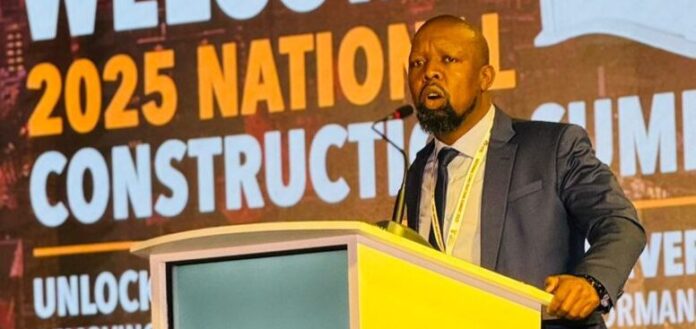South Africa’s multibillion-rand infrastructure plans are at risk of permanent paralysis unless ethical governance becomes the starting point of every project, Mpumalanga public works MEC Thulasizwe Thomo has cautioned.
Speaking at the 2025 National Construction Summit at Birchwood in Boksburg this week, Thomo said stalled projects, shutdowns by business forums, abandoned construction sites, and budget overruns were symptoms of a deeper crisis—a collapse in institutional integrity.
“At the heart of our infrastructure agenda lies not only the ambition to build roads, bridges, and public facilities,” Thomo said.
“But the greater responsibility is to build institutions of integrity, efficiency, and accountability that reflect the values of a capable and developmental state.”
Thomo chaired Commission 4 on Governance and Regulatory Compliance, which examined how government and industry can reduce project disruptions and root out corruption that continues to cripple delivery.
He said provinces cannot achieve lasting progress if contract awards favour cronies instead of competent service providers, or if weak oversight allows projects to be hijacked before completion.
“Governance is a scaffolding upon which sustainable development rests,” said Thomo.
Delegates at the commission included governance expert Dr Michael Sutcliffe, acting deputy director-general for the Expanded Public Works Programme Molatelo Mohwasa, Construction Industry Development Board (CIDB) representative Richard Raphiri, Master Builders South Africa Executive Director Roy Mnisi, and National Prosecuting Authority advocate Jacob Serepo.
Thomo argued that governance must be treated as a practical enforcement tool—not as a box-ticking exercise.
Collaborative infrastructure delivery
Transparent procurement, ethical leadership, and strong accountability systems were, he said, essential to finishing projects on time and within budget.
Drawing from Mpumalanga’s internal systems, the MEC said the province has significantly reduced disruptions by prioritising community engagement and strengthening coordination between contractors, local government and oversight teams.
He pointed to the completion of the Mkhondo Boarding School as proof that “disciplined execution” and zero tolerance for interference can deliver results.
“We must ensure that project execution and implementation remain seamless. This is how we build trust and confidence among our communities and partners,” Thomo said.
He added that major infrastructure projects with high socioeconomic benefit must be expedited—but “urgency must never come at the expense of governance”.
“Ethical governance is not an obstacle to progress; it is the very infrastructure upon which a capable, credible and people-centred government must stand,” he said.
The summit opened with keynote addresses from President Cyril Ramaphosa and Public Works Minister Dean Macpherson, both of whom called for faster, cleaner, and more collaborative infrastructure delivery.
Panels hosted by CIDB tackled transformation, capacity-building and performance across the sector.



